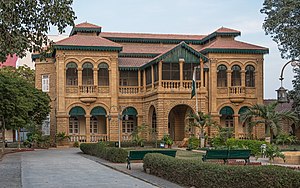Jinnah family
The Jinnah family (Urdu: خاندان جناح; Gujarati: ઝીણા કુટુંબ, جھينا کُٹومب) was a political family of Pakistan. Jinnahs have played an important role in the Pakistan Movement for creation of Pakistan, a separate country for Muslims of India. The family held the leadership of All-India Muslim League, and its successor, Muslim League, until it dissolved in 1958 by martial law. Originally from a Gujarati background,[4] they moved to Karachi from Kathiawar, Gujarat in the 19th century.[6]
| Jinnah family | |
|---|---|
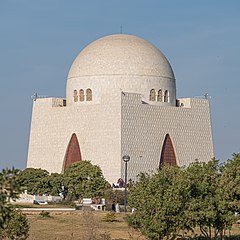 Mazar-e-Quaid, the final resting place of Muhammad Ali Jinnah and Fatima Jinnah | |
| Place of origin | Kathiawar, Gujarat, India[1] |
| Members | Muhammad Ali Jinnah Fatima Jinnah Emibai Jinnah Rattanbai Jinnah Dina Wadia |
| Connected families | Wadia family Petit family |
| Distinctions | Political prominence |
| Traditions | Shia Islam[2][3] Formerly Khoja Ismaili[4] and before that Hinduism. (Converted centuries earlier.)[5][4] |
| Religion | Shia muslim |
| Estate(s) | See full list |
Jinnah's paternal grandfather was from Paneli Moti village in Gondal state in Kathiawar peninsula (now in Gujarat, India).[4] Jinnah was the eldest of seven children of Jinnahbhai Poonja, a prosperous merchant, and his wife, Mithibai. His family was a member of the Khoja caste, Hindus who had converted to Islam centuries earlier and who were followers of the Aga Khan.[5] Although born a Khoja(noble) family who were disciples of the Ismaili Aga Khan, Jinnah moved towards the Sunni sect early in life. There is evidence later, given by his relatives and associates in court, to establish that he was firmly a Sufi Sunni Muslim.[2]
Muhammad Ali Jinnah (also referred to as only Jinnah) and Fatima Jinnah, have been important figures in the history of Pakistan. Jinnah is considered as the founder of Pakistan and he served as the first Governor General of Pakistan upon independence, while Fatima played an important role in the struggle for Pakistan Movement and was the founding mother of Pakistan. Jinnah and Fatima have remained extremely important and well-respected figures in Pakistan, even after their deaths. Several public places, universities, and hospitals in the world have been named after Jinnah and his sister Fatima, and the former's birth and death anniversary are among the public holidays in Pakistan.[7][8]
Members of the Jinnah family
The ancestors of Jinnah were Lohana (subcaste of dhudhi rajputs) from Paneli Moti village in Gondal state in Kathiawar in [[Gujarat, India]Hindus who had converted to Islam centuries earlier.[5]
Second generation
- Jinnahbhai Poonja.[5] (also referred to as Jina Poonja[9]), a Khoja (1857–1902), was married to Mithhibai.[10][5]
- Muhammad Ali Jinnah
- Ahmed Ali Jinnah
- Bunde Ali Jinnah
- Rahmat Bai Jinnah
- Shireen Bai Jinnah
- Fatima Jinnah
- Maryam Bai Jinnah
Third generation
- Muhammad Ali Jinnah (1876–1948)
- Jinnah is the founder of Pakistan and was the country's first Governor-General.His first marriage in 1892 was the result of his mother urging him to marry his cousin Emibai Jinnah before he left for England to pursue higher studies. However, Emibai died a few months later. His second marriage took place in 1918 to Rattanbai Petit (granddaughter of Dinshaw Maneckji Petit and Ratanji Dadabhoy Tata), a Parsi who was 24 years his junior. Rattanbai converted to Islam when she married Jinnah.[12] In 1919, she gave birth to their only daughter, Dina Jinnah.[13][14]
- m. Emibai Jinnah
- Dawn (newspaper) Fact File: "In his youth, Mohammad Ali Jinnah was married to a distant cousin named Emibai from Paneli village in Gujarat at his mother's urging. At the time of their marriage, Jinnah was only 16 and Emibai was 14. The marriage was arranged by his mother because she feared that when Jinnah went to England, he might end up marrying an English girl. The couple hardly lived together as Jinnah sailed from India soon after his marriage and Emibai died few weeks later."[11]
- m. Rattanbai Jinnah (1900-1929)
- Ahmed Ali Jinnah
- Bunde Ali Jinnah
- Rahmat Bai Jinnah
- Shireen Jinnah
- Fatima Jinnah (1893–1967)
- Fatima Jinnah was a dental surgeon, biographer, stateswoman, and one of the leading Founding mothers of modern-state of Pakistan. She also played a pivotal role in civil rights and introduced the women's rights movement in the Pakistan Movement. After her brother's death she continued to play a pivotal role in Pakistani politics and in 1965 returned to active politics by running against Ayub Khan in the 1965 elections.
- Maryam Bai Jinnah
Fourth generation
- Dina Wadia (1919–2017)
- Dina was born to Muhammad Ali Jinnah and Rattainbai Jinnah (née Petit) in London shortly after midnight on the morning of 15 August 1919. As Stanley Wolpert's Jinnah of Pakistan records: "Oddly enough, precisely twenty-eight years to the day and hour before the birth of Jinnah's other offspring, Pakistan."[8]
She had a rift with her father when she expressed her desire to marry a Parsi-born Indian, Neville Wadia. According to M C Chagla in "Roses in December", Jinnah, a Muslim, disowned his daughter after trying to dissuade her from marrying Neville. Dina Wadia was the only direct living link to Jinnah and the nation of Pakistan claiming her father as its own father of the nation is assumed to have some kind of kinship with her according to Akbar S. Ahmed.[15] His descendants through her are part of the Wadia family and reside in India as she married and stayed in India after the creation of Pakistan in 1947. Dina Wadia lived alone with staff in the New York City, United States.[16] Wadia died at her home in New York on 1 November 2017 at the age of 98. She was suffering from pneumonia (a bacterial lung infection).[17][18][19]
Estates
- Private estates
- Wazir Mansion, Jinnah's birthplace in Karachi
- South Court, Muhammad Ali Jinnah's former residence in Mumbai, India, currently owned by the government of India.
- Muhammad Ali Jinnah House, Jinnah's former House at 10 Dr APJ Abdul Kalam Road, New Delhi, currently the Dutch Embassy in India.
- Quaid-e-Azam House, Muhammad Ali Jinnah's House in Karachi
- Official residences
- Governor-General's House, Jinnah's official residence in Karachi
- Quaid-e-Azam Residency, Jinnah's residence in Balochistan where he spent the last days of his life
Family photos
 Jinnahbhai Poonja
Jinnahbhai Poonja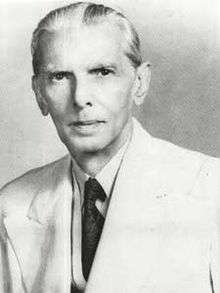
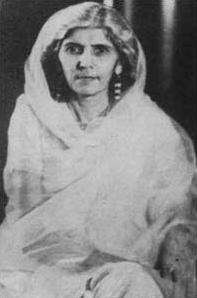
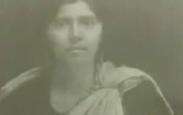
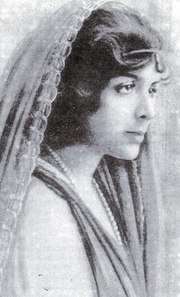
See also
References
- "Wars and No Peace Over Kashmir".
- Ahmed, Akbar (2005). Jinnah, Pakistan and Islamic Identity: The Search for Saladin. Routledge. ISBN 9781134750221.
Although born a Khoja(noble) family who were disciples of the Ismaili Aga Khan, Jinnah moved towards the Sunni sect early in life. There is evidence later, given by his relatives and associates in court, to establish that he was firmly a Sunni Muslim by the end of his life (Merchant 1990).
- Biography of Muhammad Ali Jinnah
- A. Guttman (15 October 2007). The Nation of India in Contemporary Indian Literature. Palgrave Macmillan US. pp. 34–. ISBN 978-0-230-60693-7.
- "Mohammed Ali Jinnah". britannica.com. Encyclopedia Britannica. Retrieved 6 June 2020.
- The story of Pakistan
- Guriro, Amar (30 June 2009). "Aslam Jinnah's claim of being Quaid's family disputed". Daily Times. Archived from the original on 16 April 2013. Retrieved 11 September 2012.
- The truth about Aslam Jinnah, Dawn, Liaquat Merchant, (the grandson of Maryam Bai, one of Quaid-e-Azam's sisters), JUL 10, 2009
- Closed fist worth millions
- Fact file: Jinnah's family
- The inscription on her grave at Khoja Isnaashari Cemetery, Mazgaon, Bombay, uses name Rattanbai
- Khalid, Amna (30 December 2011). "Ruttie's love letter to Jinnah". Daily Express. The Express Tribune. Retrieved 11 September 2012.
- Official website, Government of Pakistan. "Early Days: Birth and Schooling". Archived from the original on 5 November 2005. Retrieved 20 April 2006.
- Akbar S. Ahmed. Jinnah, Pakistan and Islamic Identity: The Search for Saladin. p. 18.
- Business baron Nusli Wadia attends to his ailing mother
- Dawn.com (2 November 2017). "Jinnah's only daughter, Dina Wadia, passes away at 98". DAWN.COM. Retrieved 2 November 2017.
- "Jinnah's daughter Dina Wadia dies in New York". The Hindu. PTI. 2 November 2017. ISSN 0971-751X. Retrieved 2 November 2017.CS1 maint: others (link)
- Desk, Web. "Quaid-e-Azam'S daughter Dina Wadia dies in New York - SUCH TV". SUCH TV. Retrieved 2 November 2017.
